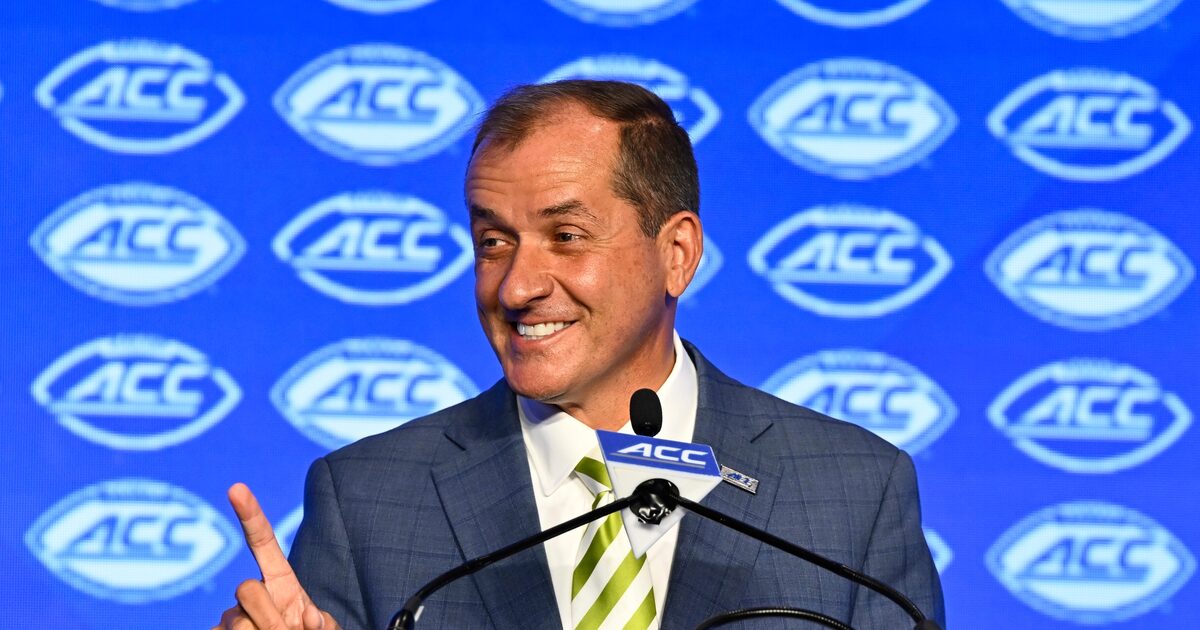The countdown to ACC football kicked off this week with coaches, players and staff across the conference meeting in Charlotte, N.C., for media days.
Head coach Rhett Lashlee and players Kevin Jennings, Logan Parr, Isaiah Nwokobia and Alexander Kilgore represented SMU and shared their outlooks for the coming season. Conference commissioner Jim Phillips revealed some changes that are coming and expressed the ACC’s stance on some of the top issues facing college sports.
Here are five things we learned from the three-day event in Charlotte:
ACC supports playoff expansion, but on certain terms
Sports Roundup
Each conference has a different take on the College Football Playoff further expanding from 12 teams to 16 or more, and it was a popular topic of conversation in Charlotte.
Phillips expressed an open mind to expansion while also applauding the first year of the 12-team playoff when the ACC was one of three conferences to secure multiple bids. Phillips said he was also in favor of the change to straight seeding, which was decided this spring.
When asked about expansion beyond 12 teams, Phillips said he’s open to a 5-9 (automatic bids-wild cards) or 5-11 model but wants one that is fair and accessible. Models proposed by the Big Ten and SEC favor those conferences in terms of the number of automatic bids, and the ACC has been firmly against those formats.
Lashlee also pitched his version of a 16-team College Football Playoff, which he said he’s in favor of if it eliminates the selection committee’s power. Lashlee said he believes the ACC is deserving of three automatic bids and four if Notre Dame doesn’t qualify.
Cracking down on court storming and sports betting
Phillips announced two policy changes, as the ACC looks to crack down on court and field storming and the impact sports betting is having on its players.
The ACC will now issue fines starting at $50,000 to institutions that allow spectators to enter the playing space before the visiting team and officials have left.
The conference is also introducing an injury report for football, men’s and women’s basketball and baseball. Phillips said it comes as athletes have been contacted about their status for sports betting reasons.
The changes will take effect this coming school year.
SMU head coach thinks ACC depth is on par with SEC
When asked about what he learned in his first season in the ACC, Lashlee spoke about the strength of schedule, parity and depth in the conference.
He used his answer as an opportunity to take a jab at another conference.
“There’s other leagues that claim depth,” Lashlee said. “But the SEC has had the same six schools win championships since 1964. The same six. Not a single one has been different since 1964. That’s top-heavy to me. That’s not depth.”
Lashlee’s comments received backlash, including from ESPN’s Paul Finebaum on Get Up.
“While he’s making fun of the SEC for winning national championships all over the place, SMU’s the most corrupt program in the history of college football,” Finebaum said. “And Rhett Lashlee has the nerve to get up there and throw stones? That’s one of the most comical and embarrassing rants I’ve ever heard.”
After SMU nearly missed out on the College Football Playoff to Alabama last year, Lashlee has more openly shared his opinions about the strength of his conference compared to others. His comments this week could be a message to the committee ahead of any decision it may have to make in December.
More to be desired from football, men’s basketball
As much as the commissioner praised the work and growth of his conference, he wasn’t afraid to criticize its marquee sports and call for better performances on the field and the court this year.
Outside of Clemson, Florida State and sometimes Miami, the ACC hasn’t been known as a deep football conference despite Lashlee’s aforementioned statements. That reputation almost made the conference a one-bid league in the College Football Playoff.
While the ACC did earn two spots in the playoff and 11 other teams participated in a bowl game, Phillips expressed frustration with the overall postseason performance.
“We can’t go 2-11 in postseason bowl games last year,” he said. “We had 13, which was incredible, and then we played poorly.”
The ACC’s marquee sport has been men’s basketball, headlined by Duke and North Carolina historically.
But only four teams made the men’s NCAA Tournament, the lowest for the ACC since 2000.
“I am restless with ACC men’s basketball, and I’m responsible for it,” Phillips said. “I feel responsibility for it. But it’s not good enough where it is right now. I know our coaches feel the same way.”
The conference is shifting from 20 conference games to 18 this year, and Phillips said the hope is it’ll allow for two more competitive nonconference games to help with strength of schedule, especially if the ACC has another down year.
Concern around cap compliance
ACC coaches and the commissioner were hopeful about the changes college sports are facing after a $2.8 billion antitrust settlement paved the way for universities to pay their athletes directly through revenue sharing.
But the primary concern is whether other universities across the country will exercise the proper restraint and follow the rules of the $20.5 million cap.
Lashlee said he expects schools to try to beat the system and pay their players beyond the allotted amount and said he’s hopeful those that do will be disciplined properly.
The commissioner in his address called on Congress to provide more guidance on NIL. Just days later, President Donald Trump signed an executive order prohibiting third party, pay-for-play payments to athletes.
On X/Twitter: @Lassimak
Find more SMU coverage from The Dallas Morning News here.
